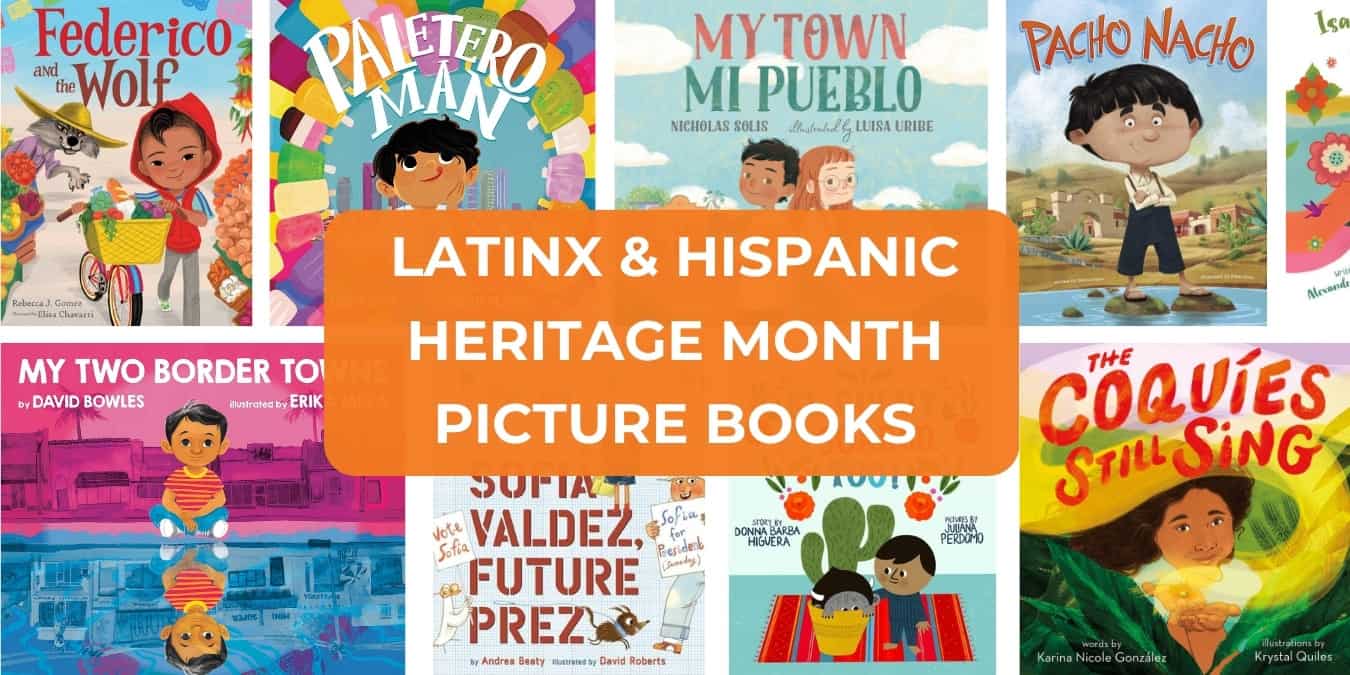Celebrate National Latinx and Hispanic Heritage Month for kids to honor the cultures and contributions of Hispanic and Latinx Americans beginning September 15 and continuing to October 15 continuing this year (2021) as it has since 1989. Read picture books to honor this month. It’s an opportunity, just like Black History Month or Asian American Pacific Islander Month, to intentionally celebrate and learn more about the Hispanic and Latinx cultures from 21 Spanish-speaking countries.
If you’re a teacher, librarian, or parent of an elementary school-age kid or preschool-age child, what activities can you do to celebrate your own culture or teach your children more about the rich cultures of Spanish-speaking countries? Here’s a list of ideas to get you started.
1. Start with a Book
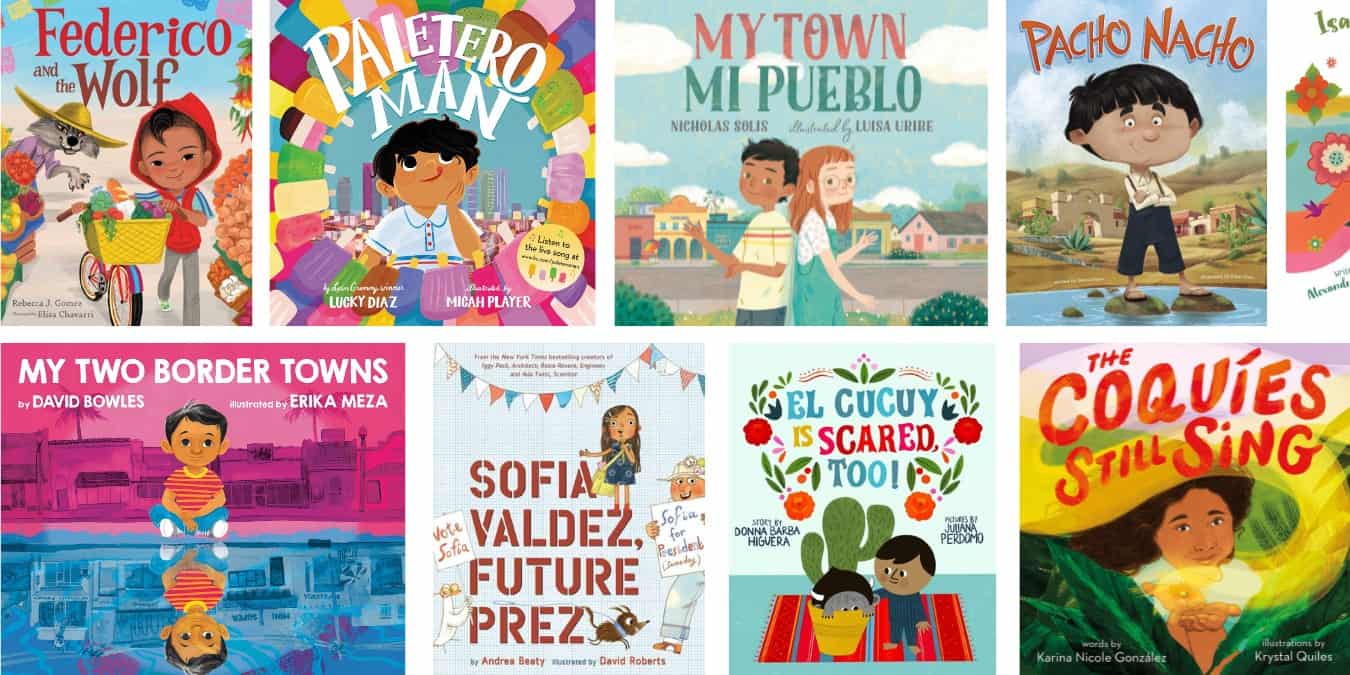
Use the book list below to get started sharing stories about characters who have Latine heritage and some of these stories include words in Spanish.
Don’t worry if you’re not a Spanish speaker; just do your best phonetically. You can always look up pronunciation on apps like SpanishDict.
2. Watch a movie or TV show in Spanish or with Spanish-speaking characters.
3. Play music in Spanish.
4. Play games that teach Spanish words.
5. Learn about Hispanic and Latinx artists.
6. Make a meal from a Spanish-speaking country.
Get a kid-favorite recipe from Costa Rica on Pura Vida Moms.
Try a Mexican-flavored family-favorite recipe from EveryDayLatina.
7. Read Aloud middle grade books with Latinx and Hispanic main characters
Latinx Picture Books for Hispanic Heritage Month for Kids
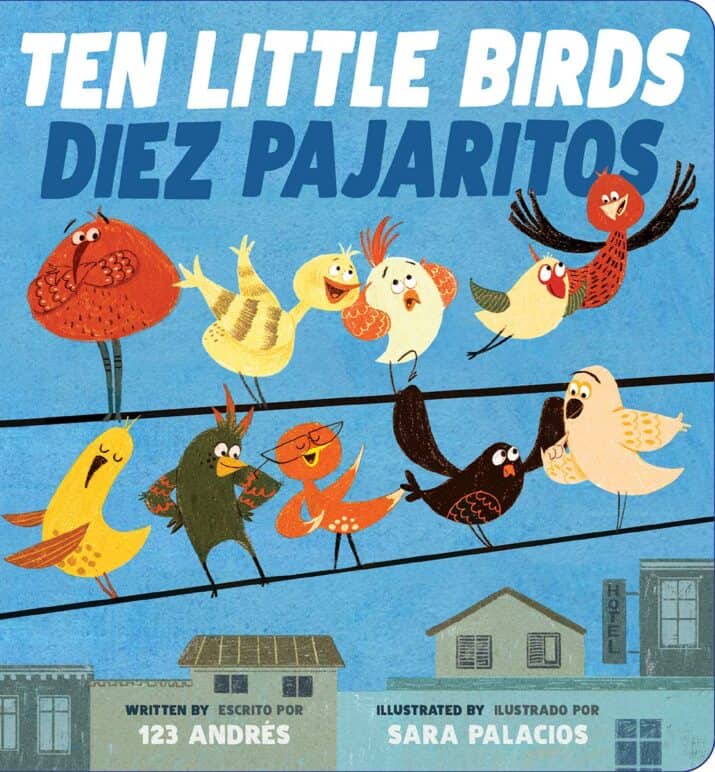
Ten Little Birds Diez Pajaritos by 123 Andres, illustrated by Sara Palacios
I really love the Spanish version of this dual language book, as it’s lyrical and fun to read out loud. Starting with ten birds on a roof, subtract two each time a cat tries to get them, and figure out how many are left afterward. When all the birds have flown away, they’ll come back for you to count, starting with one up to ten.
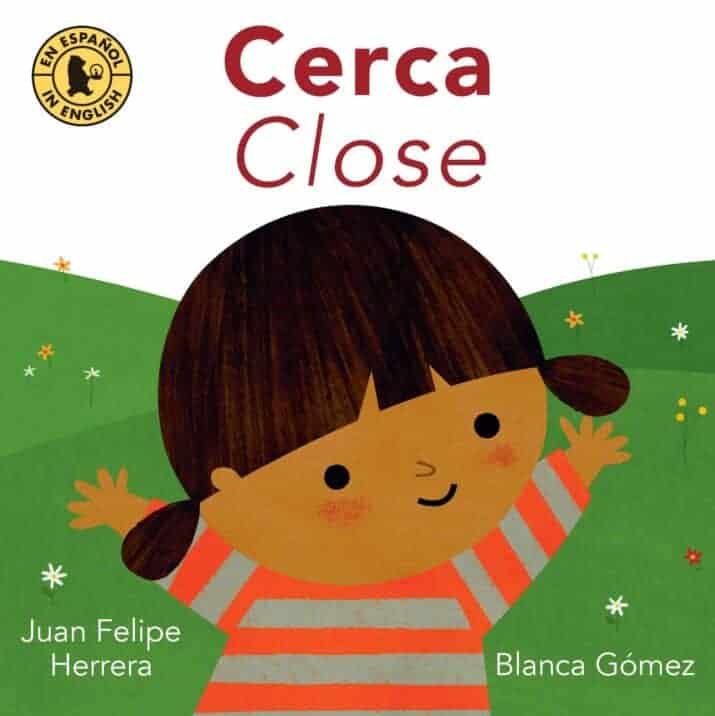
Cerca / Close by Juan Felipe Herrera, illustrated by Blanca Gomez
A young girl shows us her world, specifically what things are close to other things. She does this by connecting things together. “The door is close to the apple tree. The daisies are close to the apple tree.” What will be close to the apple tree? The horses! Read it in Spanish or English or both! “Mi amigo esta cerca de mi. My friend is close to me.” Earthy colors, an important concept (close), and enchanting illustrations.
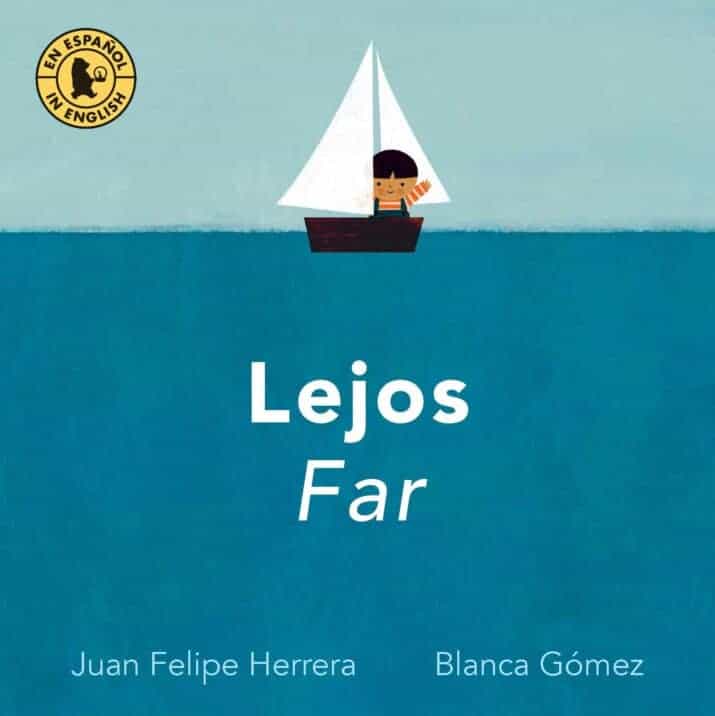
Lejos / Far by Juan Felipe Herrera, illustrated by Blanca Gomez
Like the book Cerca / Close, this bilingual English Spanish book shows things in a young boy’s world that are far apart from each other. “The lemon tree is far from my house. My house is far from the city.” It’s a lovely story that develops the concept while showing geographical features and a kid that the readers can relate to.
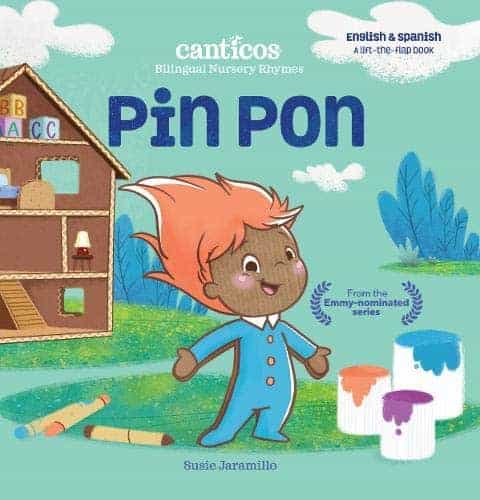
Pin Pon (Canticos) by Susie Jaramillo
Depending on the way you hold this bilingual English-Spanish children’s book, you’ll read this catchy song in either English or Spanish about a darling little cardboard boy named Pin Pon who cleans and eats and goes to bed just like a regular boy. As you learn about manners and hygiene, lift the flaps to see more to the story and nouns. Watch the Pin Pon video and hear the song in Spanish on NickJr. (So cute, right?)
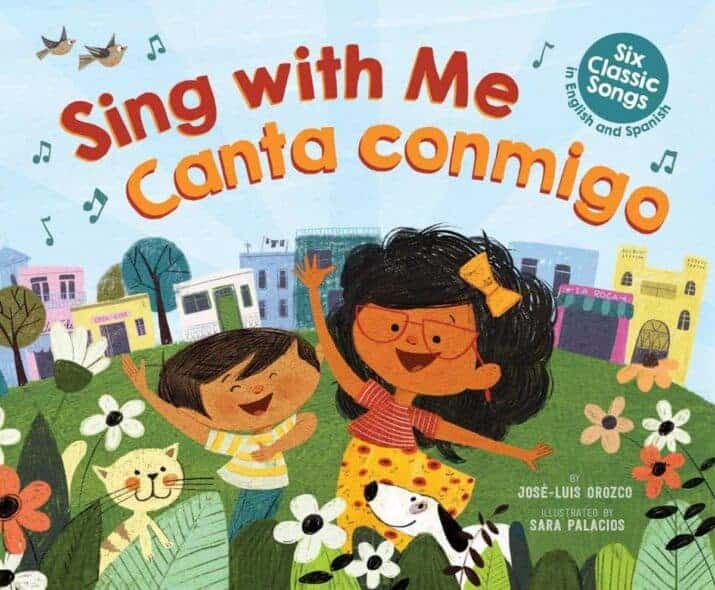
Sing with Me, Canta Conmigo by Jose-Luis Orozco, illustrated by Sara Palacios
Read and sing along with your preschoolers to favorite familiar children’s songs from the United States in both English and Spanish. Use these songs all year round and for Hispanic Heritage Month for kids because music helps children learn all sorts of things, languages included. Exciting, cheerful illustrations from the talented Sara Palacios.
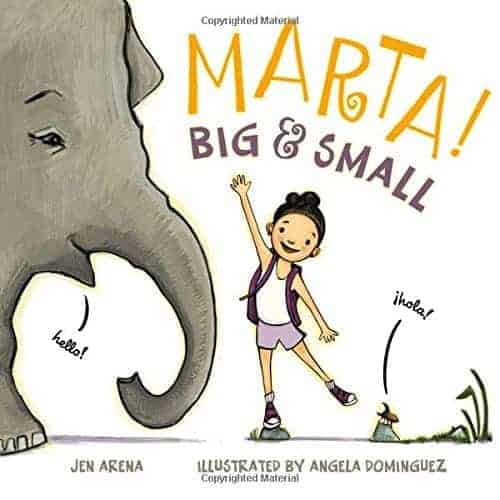
Marta! Big & Small by Jen Arena, illustrated by Angela Dominguez
Beautiful illustrations accompany this book showcasing adjective opposites about Marta and her animal friends. Loud / Quiet. Fast / Slow. Lovely!
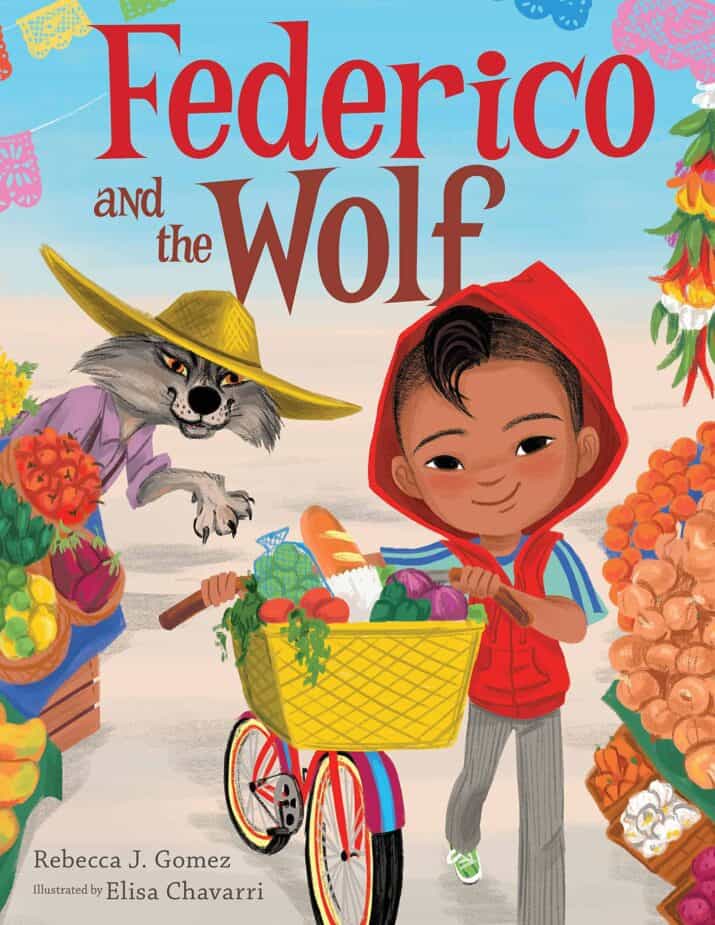
Federico and the Wolf by Rebecca J. Gomez, illustrated by Elisa Chavarri
A boy named Federico rides his bike to the marketplace to buy ingredients for his abuelo’s pico de gallo. In the woods, a wolf asks for spare food. Rico declines and continues on to his abuelo’s tienda. Of course, instead of the abuelo, it’s el lobo in disguise. Quick-thinking Rico tosses chili powder into the wolf’s snout and a habanero into his mouth. El lobo runs away and Rico saves his Abuelo. A spicy retelling of Red Riding Hood!
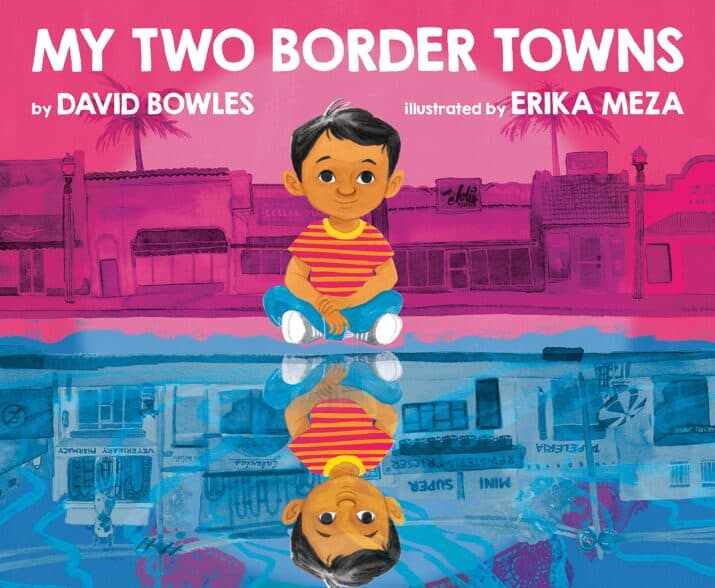
My Two Border Towns by David Bowles, illustrated by Erika Meza
Lyrical writing and vibrant illustrations about a boy and his father’s trip to El Otro Lado; a border town on the Mexico side that mirrors their own little town on the U.S. side. It’s a wonderful day of traveling the streets, stopping for savory food, chatting with friendly vendors, playing with primos, and buying a checklist of items including medicine. Before they leave the Other Side, they stop at the refugee encampment and share a bag of supplies with some new friends.
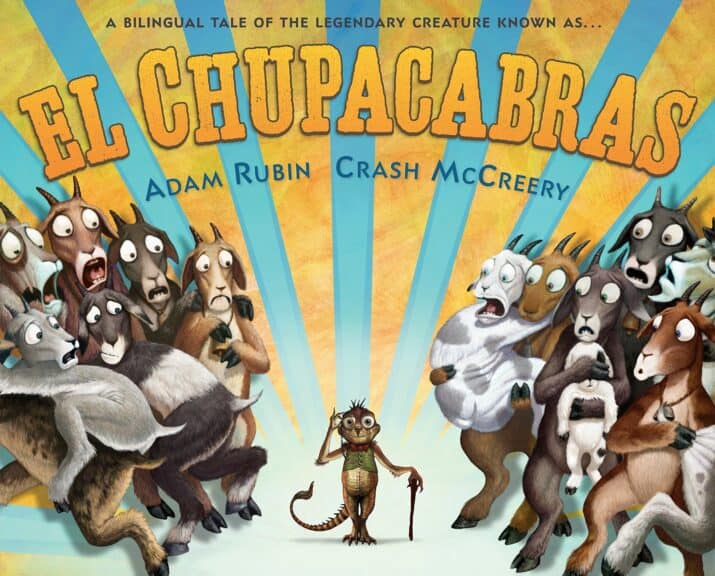
El Chupacabras by Adam Rubin, illustrated by Chas McCreery
Wacky and fun, written in sentences that mix English and Spanish and Spanish and English, this modern folktale explores the chupacabra in a way that isn’t scary. A farmer and daughter discover the goatsucker (chupacabra) has sucked one of their precious goats. So, the father asks the flower seller for help. She gives him magic powder that can make a herd of gigantic goats! Now, they do need the chupacabra’s help!
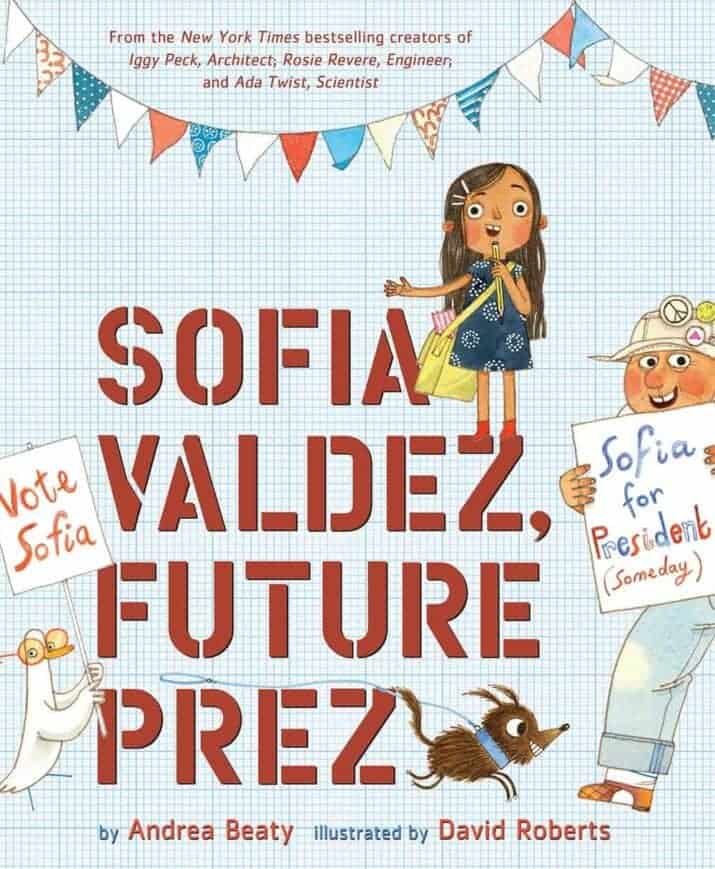
Sofia Valdez, Future Prez by Andrea Beaty, illustrated by David Roberts
When Sofia’s abuela gets hurt by a mountain of trash, Sofia wants it to be removed and replaced with safe, beautiful community spaces. Her neighbors like the idea and want benches, fountains, place spaces, a pond, and more. But who will do the work? She’s only a kid. She bravely asks for the city’s help at a city hall meeting and soon, her efforts encourage others to help transform their neighborhood.
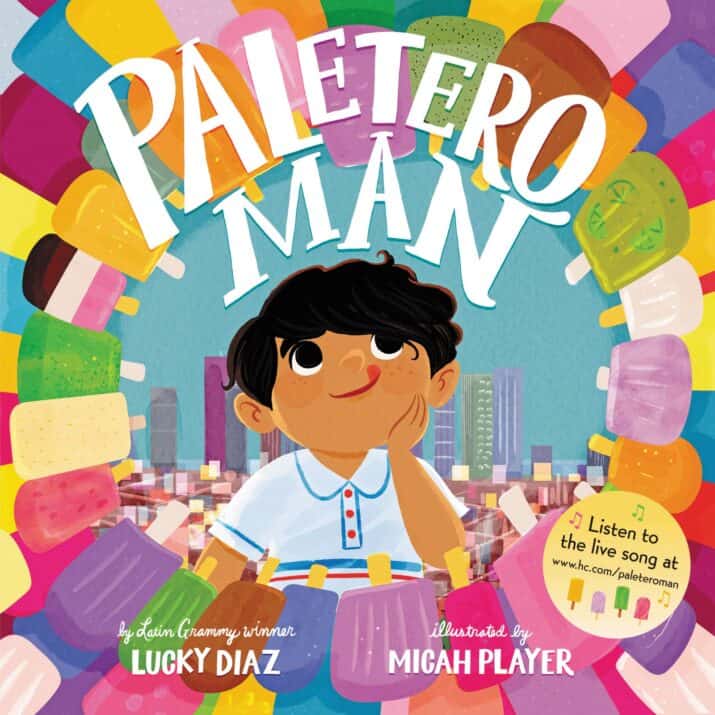
Paletero Man by Lucky Diaz, illustrated by Micah Player
In this exceptionally written and colorfully illustrated story, follow a boy taking a savory trip around the neighborhood searching for Paletero José and a refreshing Mexican frozen treat. As he searches, a familiar refrain repeats, “Can you hear his call? Paletas for one! Paletas for all!” When he finally finds Paletero José, the boy realizes his money is gone! But his neighborhood friends help –and to honor their kindness, José makes all the paletas free for all. I LOVE the Spanish words, the value of community and kindness, and the joyful illustrations.
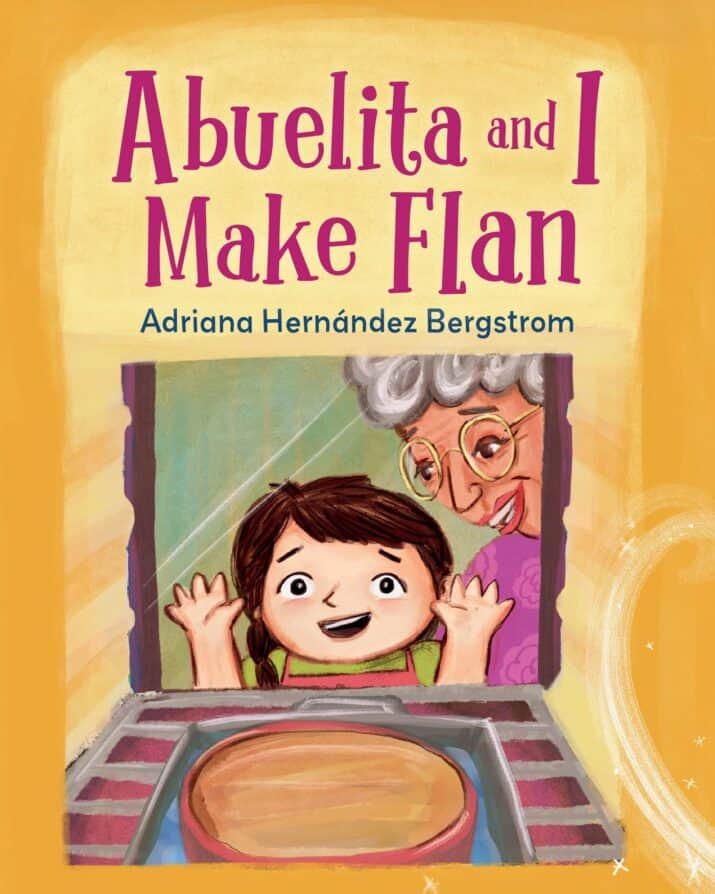
Abueltia and I Make Flan by Adriana Hernandez Bergstrom
Anita breaks Abeula’s special flan dish–and she feels guilty but doesn’t say anything while she’s helping her grandparents mix and cook and share the stories of their past. Anita finally confesses what happened, and her abuela is happy to know the truth and isn’t mad. “A plate is a plate but YOU are irreplaceable.” You’ll love the story’s relatable topic, the mix of both languages, the Cuban culture, and the love that bursts through the relationships.
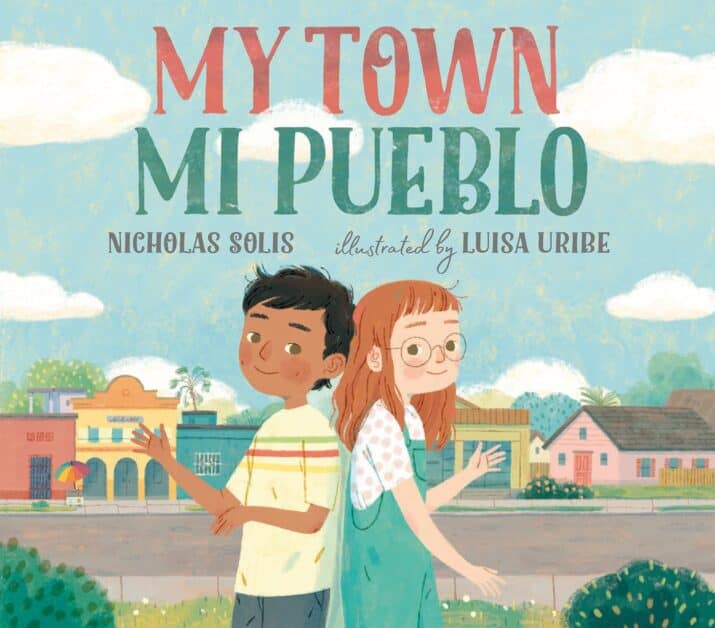
My Town Mi Pueblo by Nicholas Solis, illustrated by Luisa Uribe
Written in English and in Spanish, the same meaning for each page mirrors the cousin’s experience of sharing their love for their hometowns and visiting each other in the other country, Mexico or the U.S. Lovely and meaningful; we see the kids’ love for their community and family.
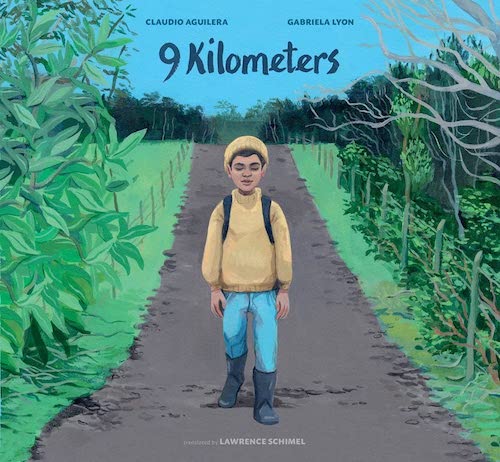
9 Kilometers by Claudio Aguilera, illustrated by Gabriela Lyon, translated by Lawrence Shimel
As the young boy walks to school through forests and on roads, over a river, and by a soccer field, he muses about 9 kilometers…how big it is and how many steps it is. He counts butterflies, ponders how fast snails can travel, and reflects on slow walks and fast walks. Eventually, the boy arrives at school. The back matter shares eight other countries where students walk to school and various birds that live in southern Chile. Exceptional!

Rafa Counts on Papá by Joe Cepeda
A sweet story of a boy and his papá who both love counting and measuring almost as much as they love each other.
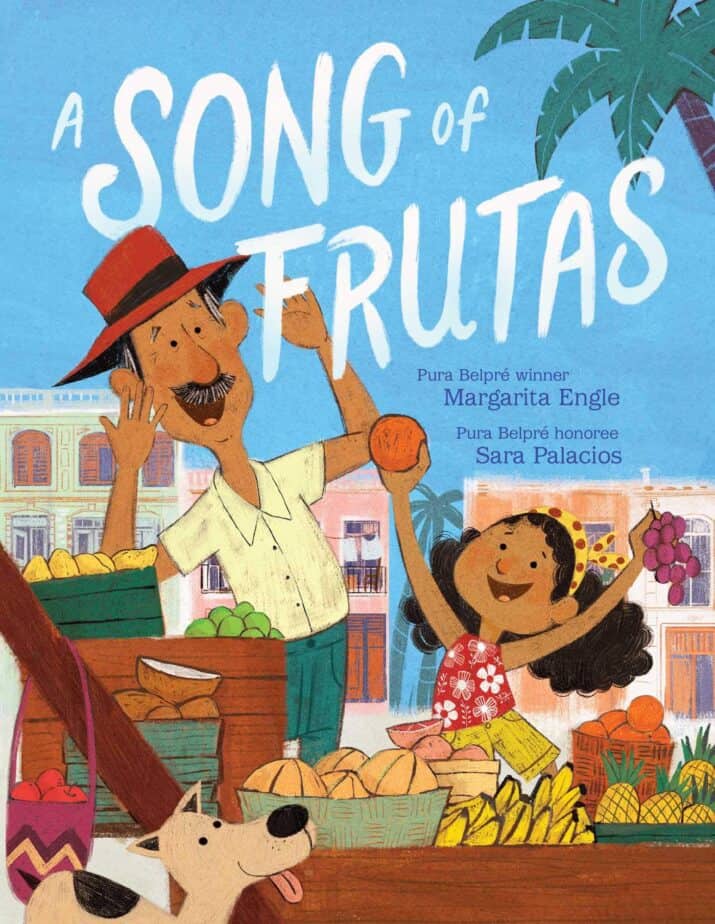
Song of Frutas by Margarita Engle, illustrated by Sara Palacios
Celebrate Cuban culture and a loving grandparent relationship in this lyrical story about a little girl’s visit with her fruit-selling Abuelo. When the little girl visits her Abuelo, she helps him sell frutas. They fill baskets lowered down on ropes. Like them, other vendors sing melodies and rhymes about their foods, tamales, yerbas, and dulces, so Abuelo must sing even louder. As her trip wraps up on New Year’s Eve, the girl eats twelve grapes at midnight, making a wish for each month, especially wishing for more visits and open borders.
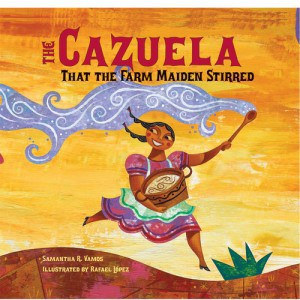
The Cazuela That the Farm Maiden Stirred by Samantha Vamos, illustrated by Rafael Lopez
Inspired by This is the House that Jack Built, Vamos writes a cumulative tale about making arroz con leche (rice pudding.) Throughout the story, she introduces nouns in Spanish, which, because of her format, repeat as she adds on. A fun and celebratory read aloud picture book!
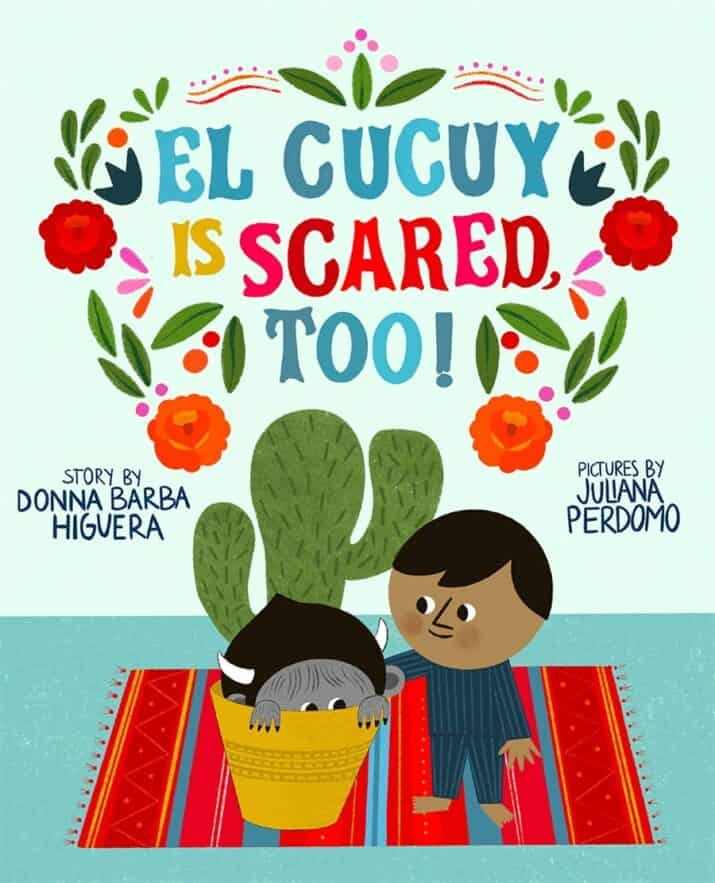
El Cucuy Is Scared, Too! by Donna Barba Higuera, illustrated by Juliana Perdomo
Ramón isn’t scared of El Cucuy anymore (the boogieman) because he’s more worried about his first day of school. And El Cucuy feels the same — he misses their old home and the desert. Ramon reassures El Cucuy that they’ll both get used to it and make new friends and that El Cucuy is strong and brave; they both are. It’s a sweet story of friendship with colorful, vibrant illustrations.
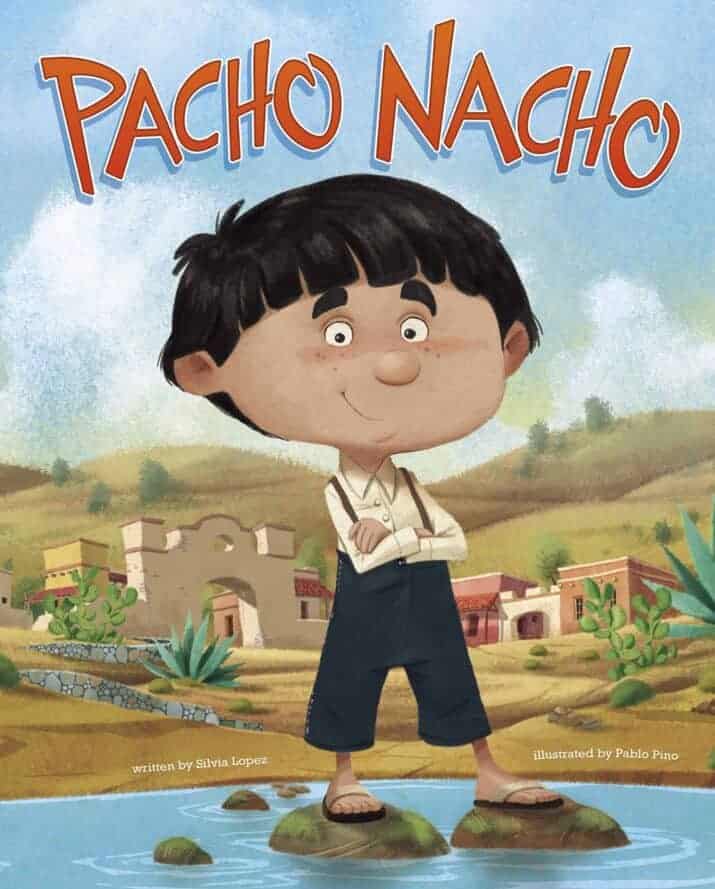
Pacho Nacho by Silvia Lopez, illustrated by Pablo Pino
This hilarious story begs to be read aloud. It’s about a family with two sons. The oldest son has a VERY long name that his parents insist everyone use, Pacho-Nacho-Nico-Tico-Melo-Felo-Kiko-Rico. This name appeased the family, who suggested all the names, but when he falls into the river, it takes so long for his brother Juan to say his name and get help that the parents decided to shorten his name. Based on an old Japanese folktale, you’ll love the retelling set in Mexico interspersed with Spanish words.
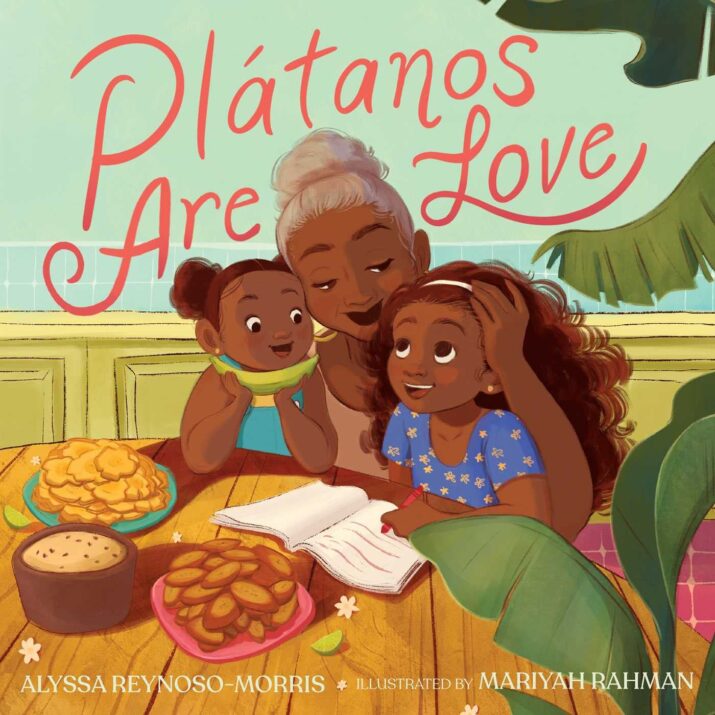
Plátanos Are Love by Alyssa Reynoso-Morris, illustrated by Mariyah Rahman
When Esme goes to the market with Abuela, she picks out plátanos. When they return home to cook, Abeula cooks a receta for breakfast of plátanos verdes and slices and fries tostones. Abuela shares how plátanos are important to their family heritage, that plátanos are love and to share. Esme tells her little sister how they need to ripen to black to be sweeter and ready to share in more recipes. Written in a mix of English and Spanish, this is a beautiful celebration of family, culture, and food!
More Hispanic Heritage Month Latinx Picture Books
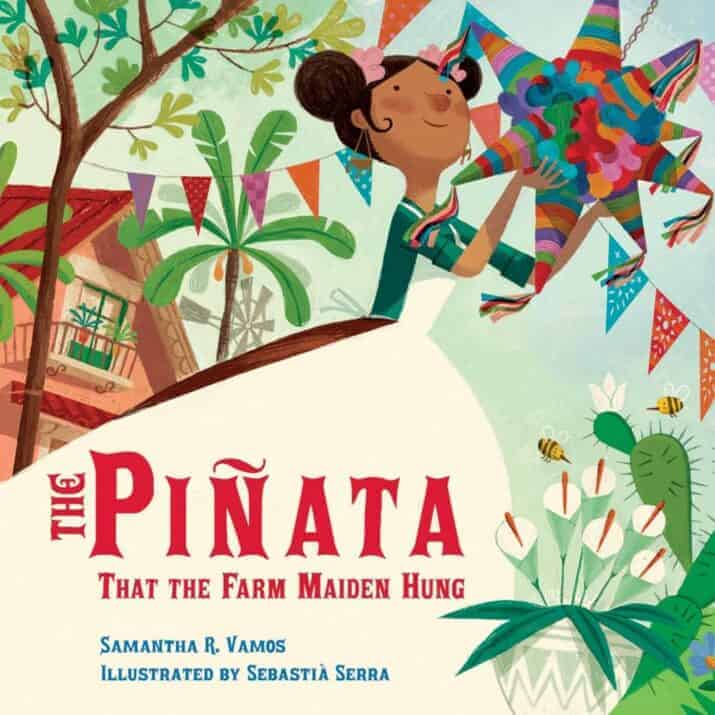
The Piñata That the Farm Maiden Hung by Samantha R. Vamos, illustrated by Sebastia Serra
You’ll have a blast reading this cheerful, lyrical bilingual story! The farm maiden hangs the piñata. Who is it for? How did it get to be ready? Watch how the farmer, his family, and the animals help prepare the piñata and the birthday party festivities. Spanish words are in bolded capital letters and supported with lively illustrations so readers can infer what each word means. The repetition will help reinforce each new word.
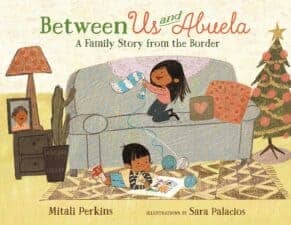
Between Us and Abulea A Family Story From the Border by Mitali Perkins, illustrated by Sara Palacios
This small moment focuses on the trip to the U.S./Mexico border that a Latine family takes in order to reunite for las posadas. They arrive at the border fence where you’ll see the fence, see the regular people, and see the kids and their mama talking to their abuela between the fence slats. In a sweet resolution, when the boy can’t give his abuela his drawing, the little girl helps make it into a kite to fly it over the top of the fence.
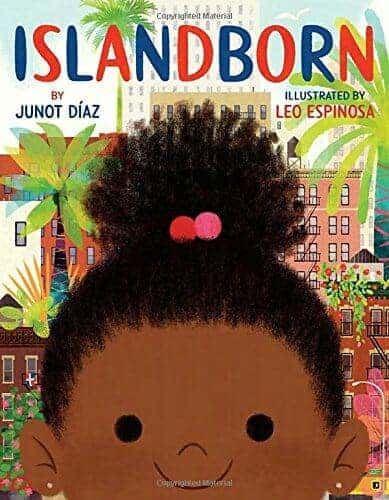
IslandBorn by Junot Díaz, illustrated by Leo Espinosa
Lola’s longs to remember the island of her birthplace for a school assignment. She left the island as a baby, so she can’t remember. Lola interviews her family and friends, listening to their snap-shot, detailed stories of the island’s bats, music, agua de coco, heat, and the Devil Monster. Through their stories, she creates her own tapestry of island memories that will always be in her heart. Stunning illustrations explode in colorful exuberance on every page of this picture book.
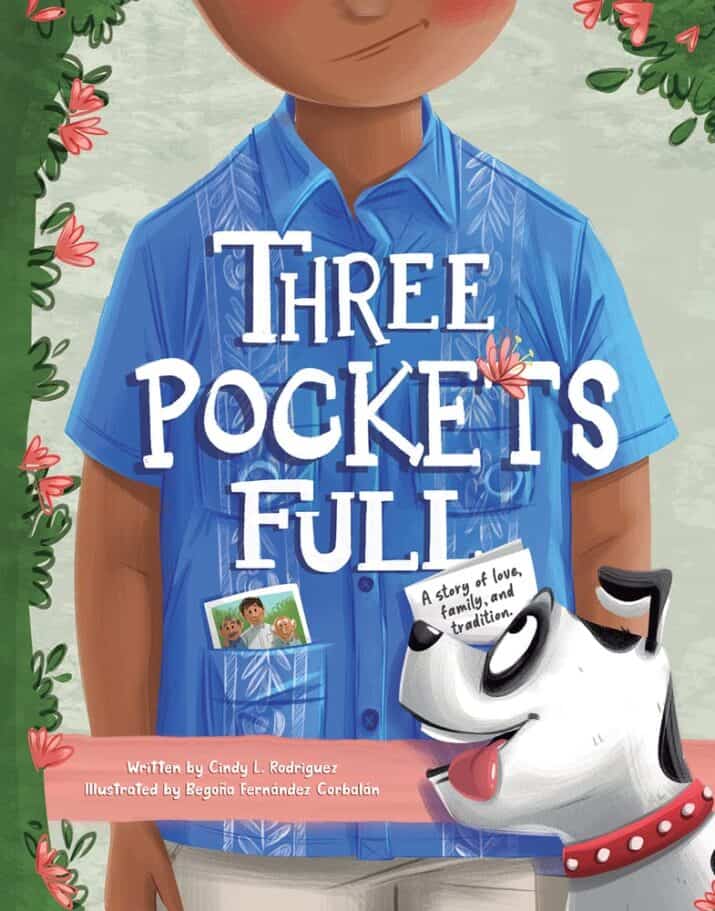
Three Pockets Full by Cindy L. Rodriquez, illustrated by Begonia Fernandez Corabalan
Beto refuses to wear a traditional guayabera to the wedding. He writes his mami letters (she writes him back) with all his excuses and reasons. Up until the end, we think this story is about not wanting to wear the shirt, but it’s really about the mom getting remarried and Beto missing his dad. It’s funny and poignant, with a sweet, gentle ending.
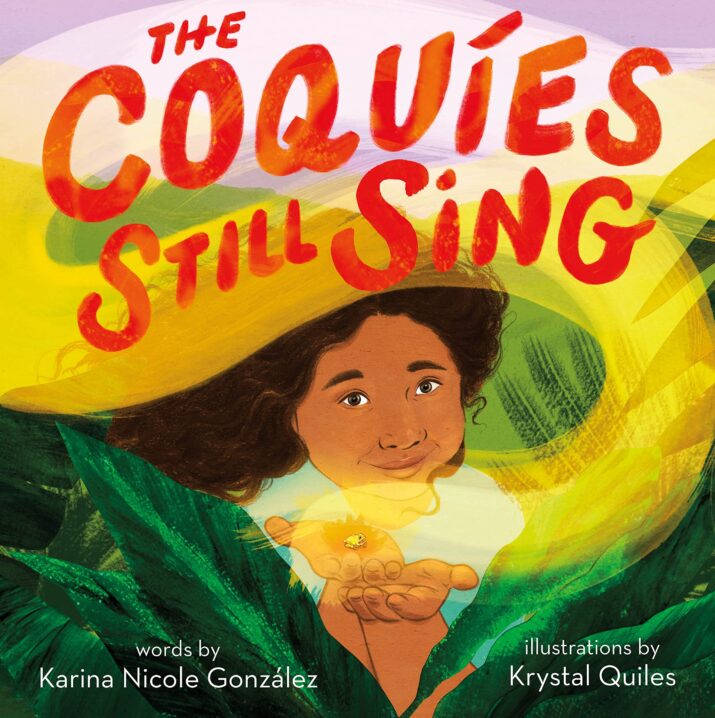
The Coquies Still Sings: A Story of Home, Hope and Rebuilding by Karina Nicole Gonzalez, illustrations by Krystal Quiles
A singing frog lives in their mango tree. But when a hurricane destroys Elana’s home and many other homes, the frog is gone, and so are many other things. Elana helps her family and friends rebuild. Months later, her home looks different, green buds sprout on the mango tree, and she hears a frog’s song CO-QUI, CO-QUI. The song brings joy and a feeling of home.
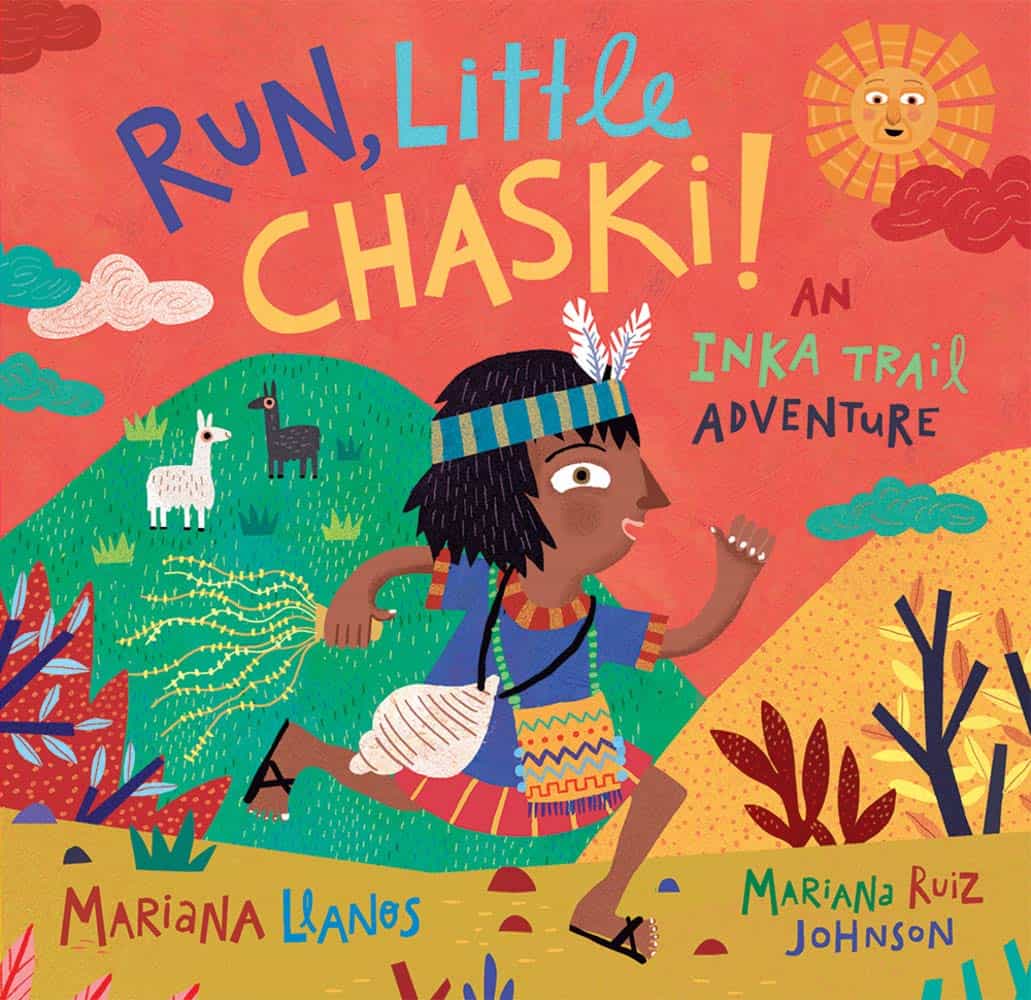
Run, Little Chaski! An Inka Trail Adventure by Mariana Llanos, illustrated by Mariana Ruiz Johnson
Set in ancient Peru, a young Inka boy named Chaski gets to be the newest messenger for the queen. His task is to run fast and deliver a khipu to the temple. Run, run, Little Chaski! Along the way, he stops to help animals in need — and tries to run even faster because of the delay. At the end, he realizes he doesn’t have the khipu! Luckily, his animal friends bring it to him, and the King explains that by helping the animals, Chaski has passed the test and has earned the name Big Hearted. Gorgeous, colorful illustrations!
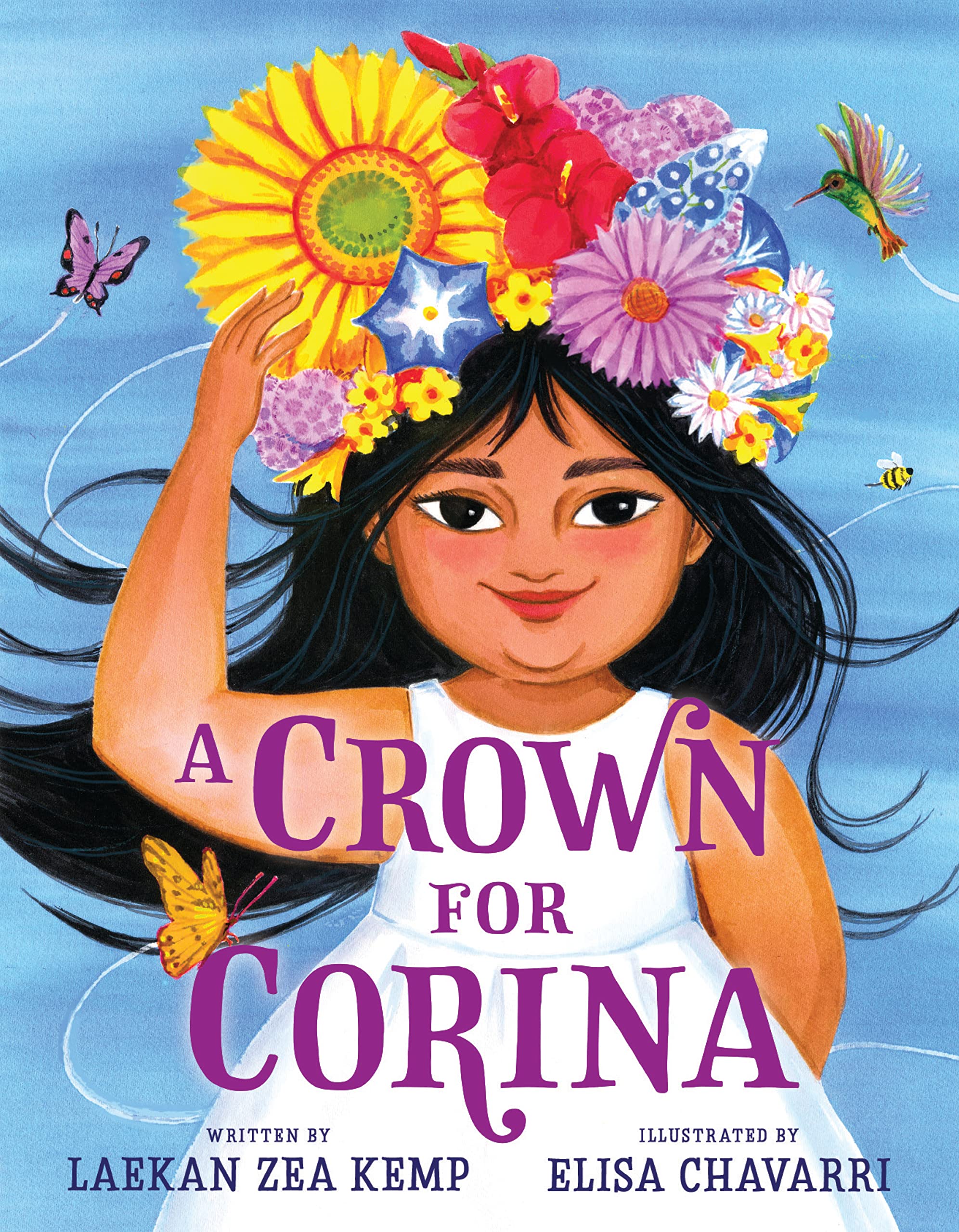
A Crown for Corina by Laekan Zea Kemp, illustrated by Elisa Chavarri
On Corina’s birthday, she gets to pick out flowers from Abuela’s garden that tell her story— who she is and where she came from. Carina picks bluebonnets to remind her of her conejo’s tail, and a sunflower for Mama, coneflowers for her Abuela’s hat…then she puts them together into her crown, la corona. Exhuberant, color-filled illustrations!
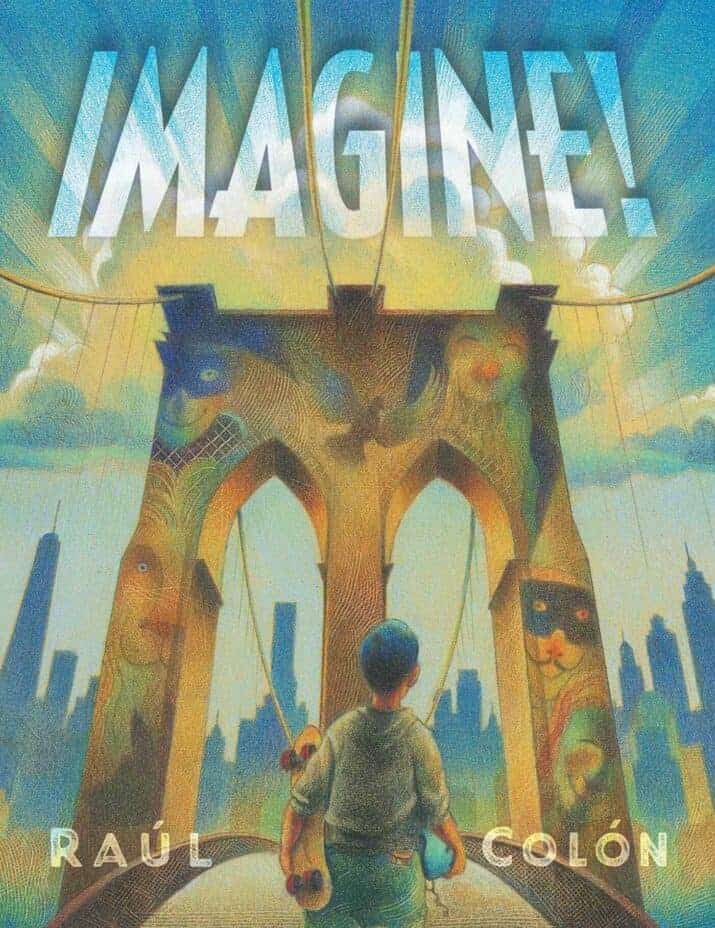
Imagine! by Raúl Colón
A celebration of New York City and the magic of artwork! The illustrations say everything in this wordless picture book…When a skateboarding boy visits the Museum of Modern Art, the paintings come to life. Painted people and animals step out of their frames to exuberantly explore New York City with the boy. They visit a roller coaster, the Statue of Liberty, a hot dog stand, Central Park, and then return to the museum and their canvases. The boy finds an empty building wall where he paints a large mural about his joyful day. Colon’s richly textured, earth-colored illustrations sparkle with energy.
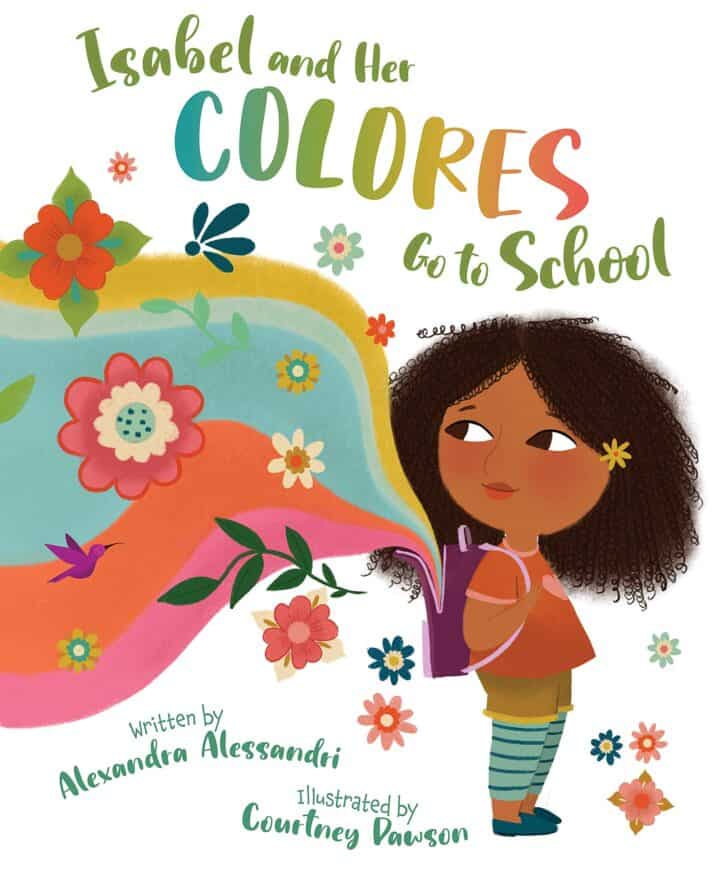
Isabel and Her Colores Go to School by Alexandra Alessandri, illustrated by Courtney Dawson
Isabel doesn’t want to go to school. She experiences languages in COLORES –her native language of Spanish feels like pink, yellow, and purple, while the INGLES she’s learning seem like stormy blues and blizzard whites. And at school, the colors swirl all around her as she tries to follow along even when she doesn’t understand. Ultimately, Isabel uses her COLORES to bridge the language barrier and make a new friend.
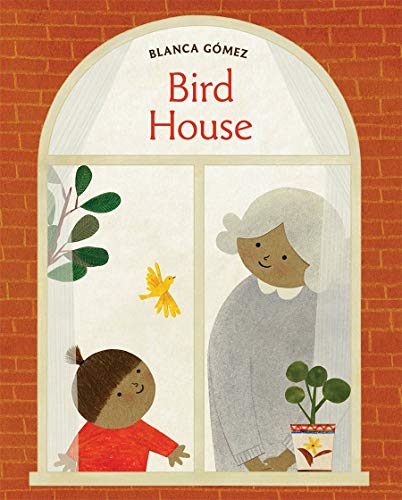
Bird House by Blanca Gomez
Simply told and illustrated, this is a warm-hearted grandmother-granddaughter story showing how the abuela helps the little girl learn about caring for nature. A girl and her abuela rescue and nurse an injured bird. When the bird is healthy again, the abuela explains to the girl that they need to let it be free. Later in the spring, the bird visits but doesn’t stay because it’s not theirs to keep.
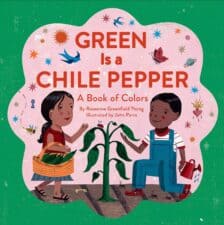
Green Is a Chile Pepper A Book of Colors by Roseanne Greenfield Thong, illustrated by John Parra
Oh, I adore this picture book so much! The illustrations, the small poems of colors, I love it all. We read about orange marigolds for the Day of the Dead, yellow masa for tamales and tortillas, pink adornos, brown churros, and more special unique Mexican cultural elements.
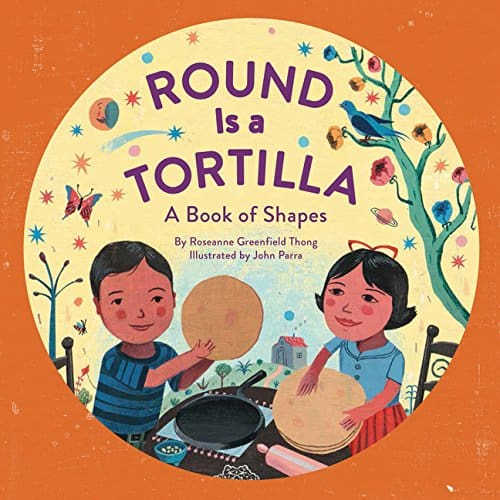
Round Is a Tortilla: A Book of Shapes by Roseanne Greenfield Thong, illustrated by John Parra
“Round are sombreros. Round is the moon. Round are the trumpets that blare out a tune” begins this colorful Latine-flavored shape book. As we journey through the day, we find the shapes all around us. “Triangles are crunchy chips for guacamole and other dips.” I absolutely love this book. I’m so glad to see a book of shapes that stands out from the crowd and celebrates Latin culture.
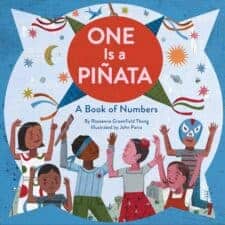
One is a Piñata A Book of Numbers by Roseanne Greenfield Thong, illustrated by John Parra
Count Spanish objects and words in rhyming text. If you don’t know, use the illustrations and context clues to figure out what the words mean. “Four are bolillos just waiting to dip in four cups of chocolate but first take a sip.” For kids that do speak both English and Spanish, this book celebrates bilingualism and culture! It’s fun, festive, and affirming and perfect for Hispanic Heritage Month.
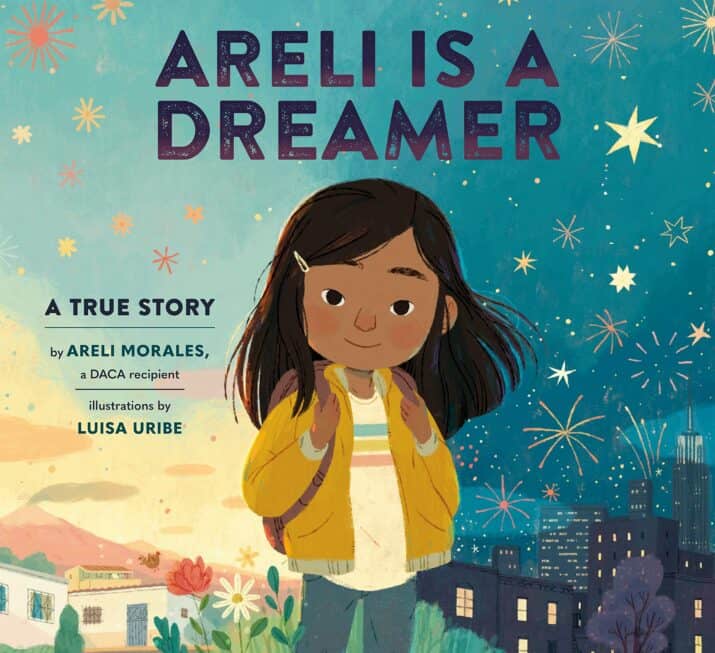
Areli is a Dreamer by Areli Morales, illustrated by Luisa Uribe
Areli Morales grows up in Mexico with her abuela until age six when she leaves Mexico to join her parents and brother where they live and work in New York. Life in New York takes some getting used to — but she learns English and becomes comfortable in her new home with a big future filled with possibilities. An inspiring personal narrative story based on the author’s life.
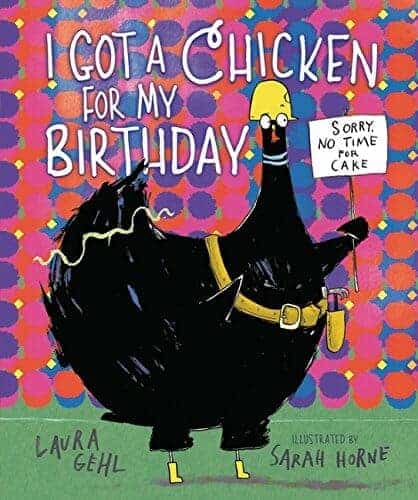
I Got a Chicken For My Birthday by Laura Gehl, illustrated by Sarah Horne
SUCH a funny story! A little girl asks Abuela Lola for tickets to an amusement park for her birthday. Much to her surprise, Abuela Lola gets her a chicken instead!! Weird. And it’s a chicken who is too busy to eat, too busy to lay eggs and steals her dog and cat. But don’t worry. The new chicken is actually a genius. Stunning illustrations throughout. (And I predict you’ll want a chicken like this for your birthday, too.)
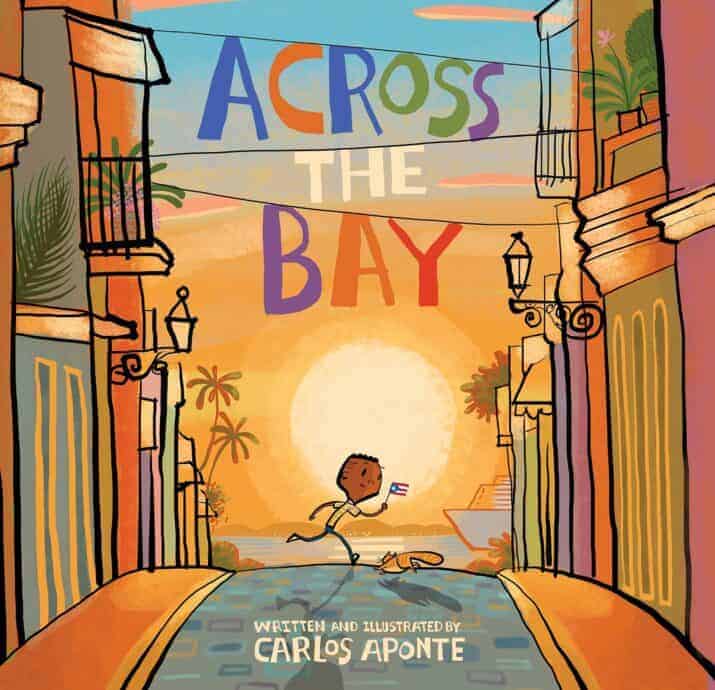
Across the Bay by Carlos Aponte
Based on the author/illustrator’s childhood, this is a tender story about little Carlitos, who leaves his family’s home to travel across the bay to San Juan and search for his father. His experiences give readers the flavors of Puerto Rico with the old men playing dominoes, a parade with singing and guitars, and kite flying near the castle. Tired from his unproductive search, a park ranger reminds Carlitos that his father will be forever in his memory whether he’s found or not. And Carlitos goes back home to his mama, abuela, and cat. Whimsical, colorful illustrations create a festive yet gentle ambiance.
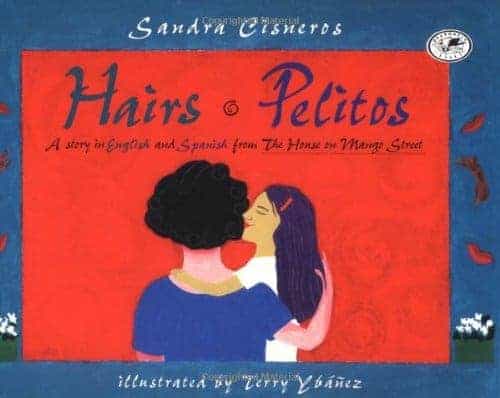
Hair / Pelitos by Sandra Cisneros
I love this descriptive bilingual book that uses the senses to celebrate the different kinds of hair in her family.
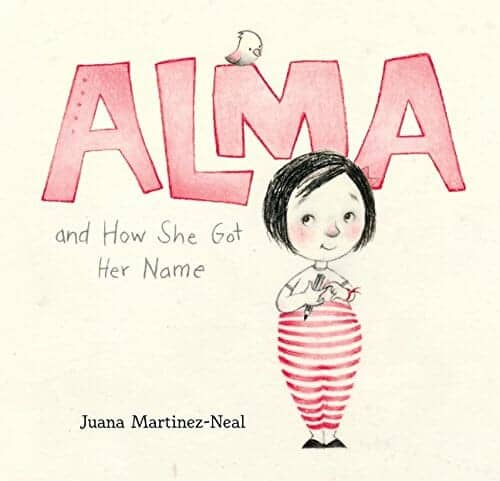
Alma and How She Got Her Name by Juana Martinez-Neal
Alma Sofia Esperanza Jose Pura Candela thinks her name is too long …until her father explains about each person she was named for — like Esperanza, Alma’s great-grandmother who hoped to travel. This helps Alma make a personal connection to each person she’s named for. With Esperanza, she says, “The world is so big! I want to go see it, Daddy!” Names are important. This story would be a wonderful way to talk with your child about not just your child’s name but the names in your family, too. Soft, muted colors give this story a nostalgic atmosphere.
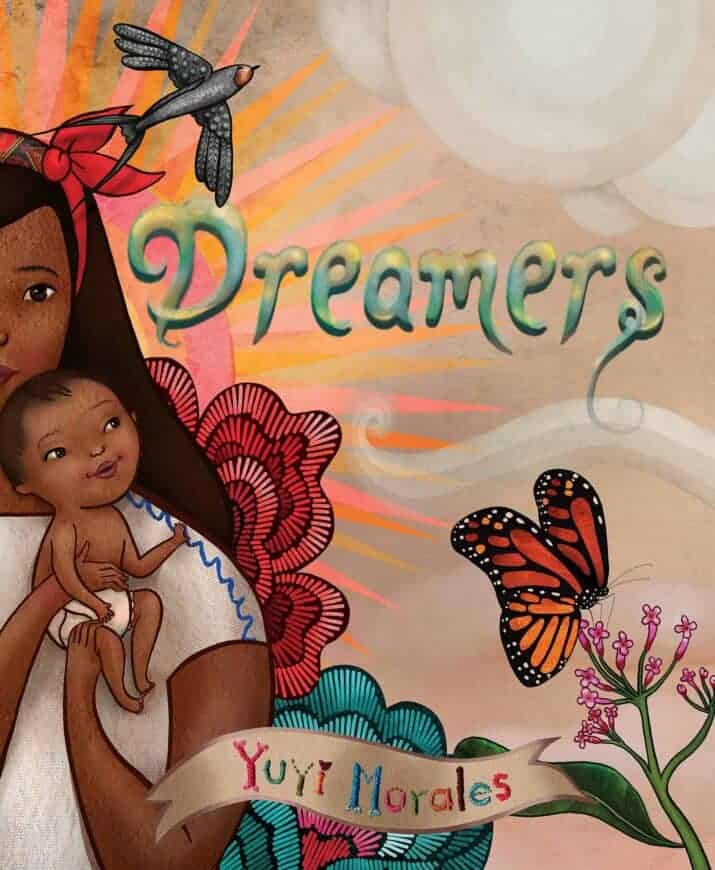
Dreamers by Yuyi Morales
The narration takes you on an immigration journey of a mom and child together, going to a new place to live, celebrating their loving bond, and how books helped them develop their voices in a new country. Exquisite illustrations!
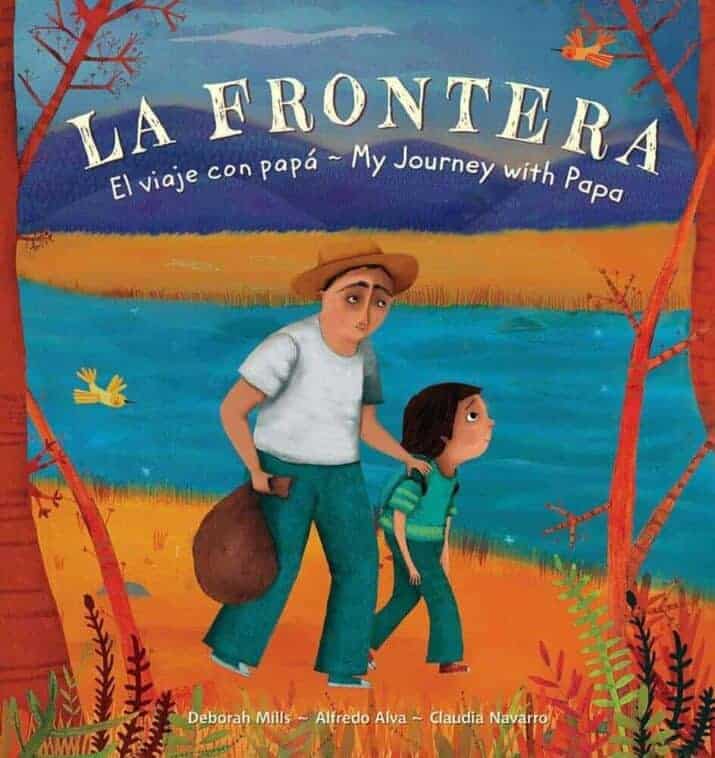
La Frontera El Viaje con papa My Journey with Papa by Debora Mills, Alfredo Alva, Claudia Navarro
Based on a true story, this bilingual story is about Alfred and his papa who leave their Mexican village to find work. They meet a “coyote” who is supposed to take them to the United States but they’re abandoned and must cross by themselves. Their journey is hard. Eventually, they arrive in Texas. Alfred begins school and learns English, but he still misses his mother and siblings very much. After many years, he is reunited with his whole family.
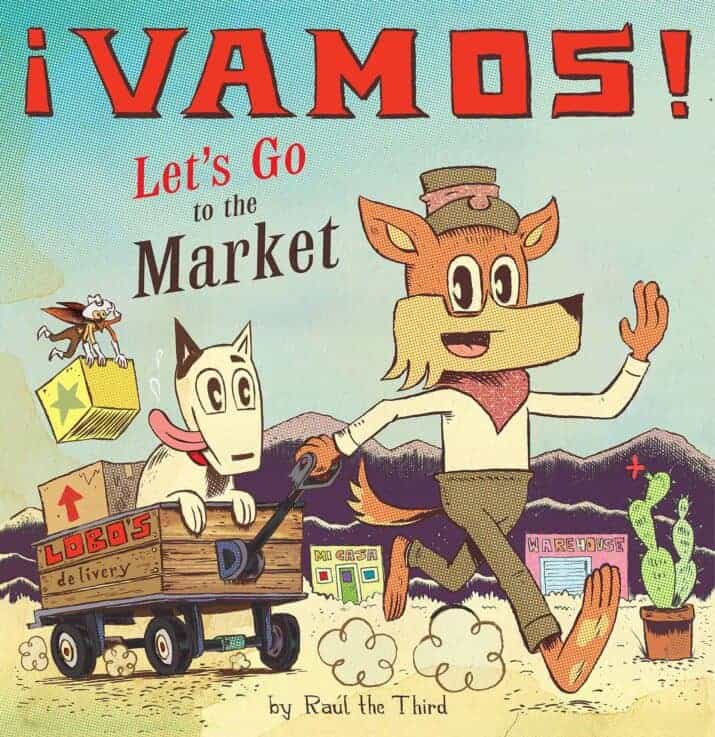
Vamos! Let’s Go to the Market by Raul the Third
We like that this book is written in a mix of Spanish and English words and labels objects in Spanish. If you don’t mind that the pages are crowded with illustrations and smallish text, you can follow along with Little Lobo and his dog Bernabe delivering supplies to vendors in the market.
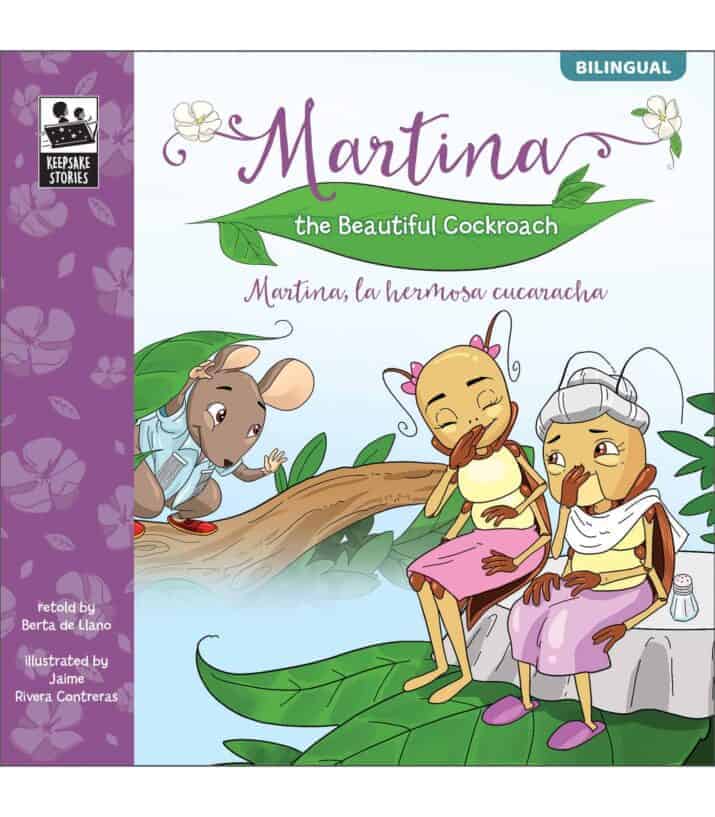
Martina: The Beautiful Cockroach / Martina, la hermosa cucaracha by Berta de Llano, illustrated by Jaime Rivera Contreras
Doña Julia wanted to help Martina find a suitable groom. So she devised a tricky test for prospective suitors. Anyone who would drink the disgusting tembleque with added salt would show that they really liked being with Martina. Eventually, she meets Perez, a kind mouse, who passes the test and they get married in a big ceremony. A wise and entertaining Puerto Rican folktale in English and Spanish.
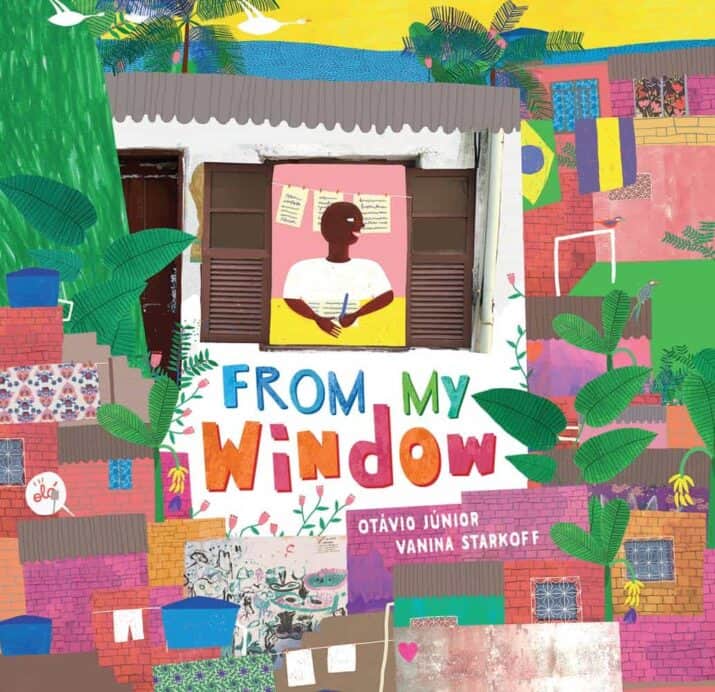
From My Window by Otavio Junior, illustrated by Vanina Starkoff
This slice of life in Brazil is filled with amazing illustrations! Read about what a boy sees, dreams, and does from his favela window, like talking to friends, seeing people patching roofs, and imagining soccer (football) games.

Rudas: Niño’s Horrendous Hermanitas by Yuyi Morales
A companion book to Niño Wrestles the World, this is a new action-packed wrestling adventure about the Niño’s badly behaved (rudas) little sisters. Farting, biting, fighting, . . . how will these rude sisters be defeated? Maybe their brother can distract them with a book!? You’ll read lots of Spanish words throughout whose meanings, if not inferred, are explained on the jacket covers. Vibrant artwork makes the antics of these sisters that much more exciting.
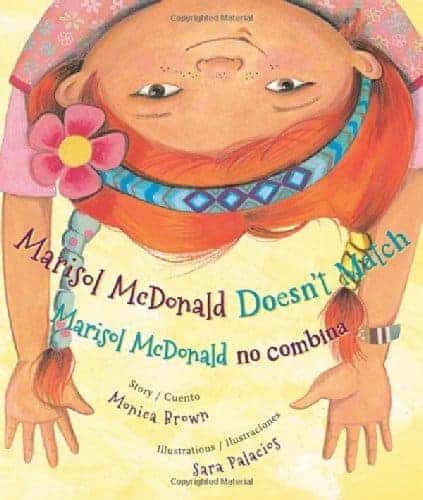
Marisol McDonald Doesn’t Match by Monica Brown, illustrated by Sara Palacios
You’ll adore Marisol because she’s a spunky girl with a unique Peruvian-Scottish-American background. To her, this means that she doesn’t match. She doesn’t fit into a box or to a label and– that’s okay! A fun story about self-acceptance!
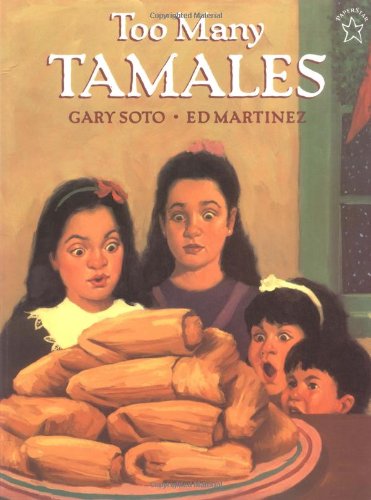
Too Many Tamales by Gary Soto, illustrated by Ed Martinez
Christmas Eve is for family and tamales. But this time, when they’re preparing the tamales, Maria accidentally buries her mother’s diamond ring in the batch of tamales. Now, what will she do?
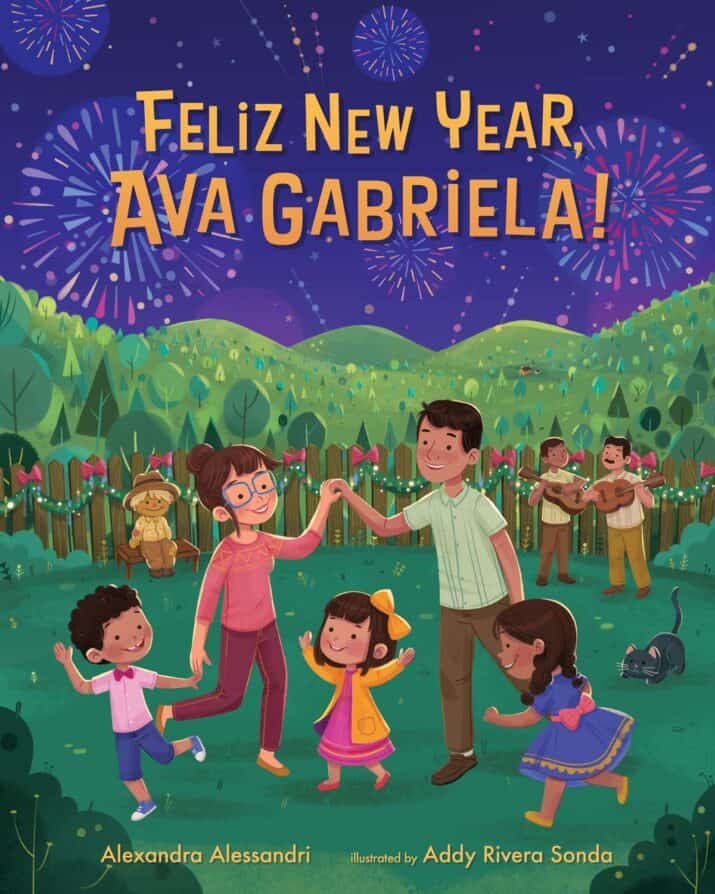
Feliz New Year, Ava Gabriela! by Alexandra Alessandri, illustrated by Addy Rivera Sonda
Ava Gabriela’s shyness makes the words stick in her throat. Mama says, “What you’re ready, your voice will come out and play.” Her large extended family is welcoming and understanding that Ava Gabriel doesn’t speak much, they invite her to join them in preparing for the new year with decorations and food. At night, the family has a wonderful celebration of dancing, food, and fun. A perfect celebration of being yourself and of Latin culture.
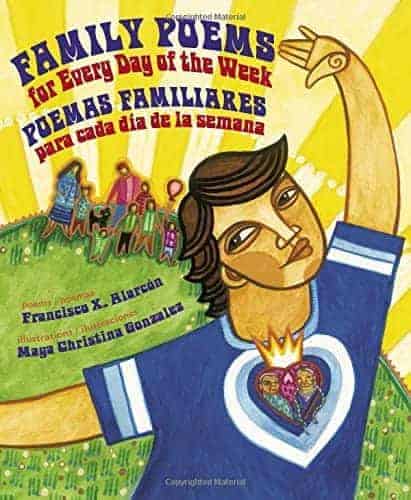
Family Poems for Every Day of the Week / Poemas Familiares para cada dia de la semana by Francisco X. Alcaron, illustrated by Maya Christina Gonzalez
Poems celebrate the days of the week as well as a Latine cultural experience based on the author’s own life. Sunday is the day for family. Monday is named for the moon. Wednesday celebrates Mercury and is for the farmer’s market. Vibrant folkloric illustrations catch your eye as the poems travel through the week.
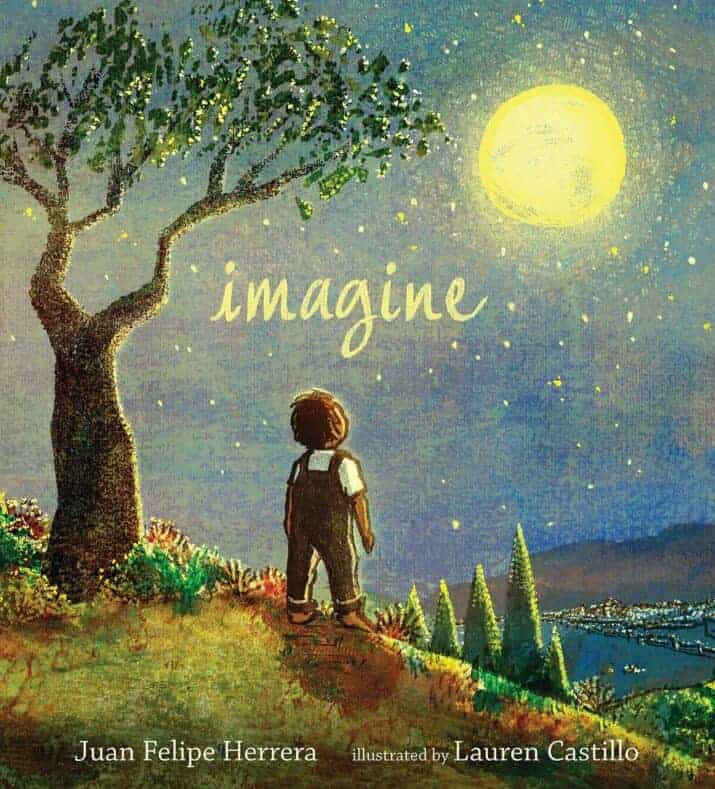
Imagine by Juan Felipe Herrera, illustrated by Lauren Castillo
Lyrical text matched with beautiful illustrations transports readers into the atmospheric world of a young boy whose life is filled with nature, moving, and hard work, eventually leading him to become the poet Laurette of the United States. What an inspiring accomplishment, especially since English was his second language! As the boy shares about his childhood, each page ends with the repetition of “imagine”. What a great way for children to reflect on their own future possibilities.
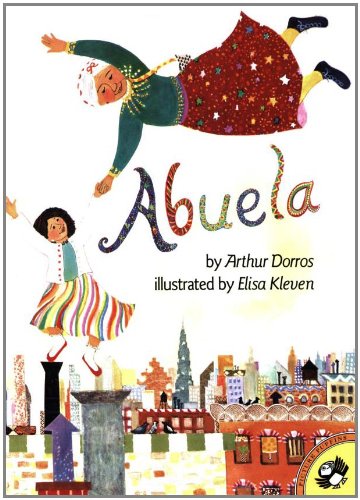
Abuela by Arthur Dorros
Abeula and Rosalba fly over New York City, seeing the sites and sounds from above with Spanish words peppered throughout.
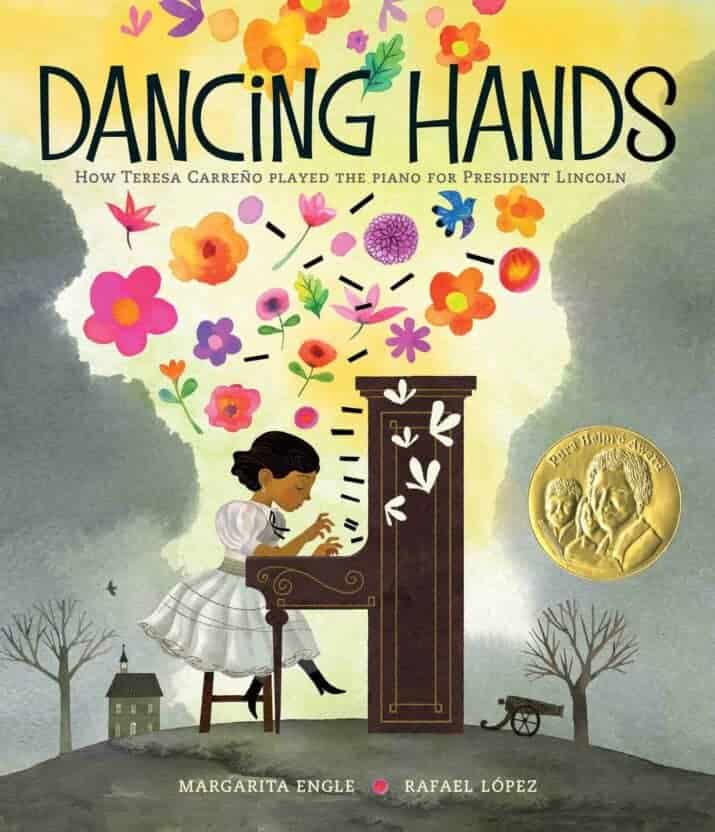
Dancing Hands: How Teresa Carreno Played the Piano for President Lincoln by Margarita Engle, illustrated by Rafael Lopez
As a little girl, Teresa started playing the piano in her home country of Venezuela. She moved with her family to the United States during the Civil War where she used music to bring hope to people, even President Abraham Lincoln, earning the nickname “Piano Girl”. Evocative imagery in the writing paired with Lopez’s gorgeous, colorful illustrations make this a lovely sensory experience.
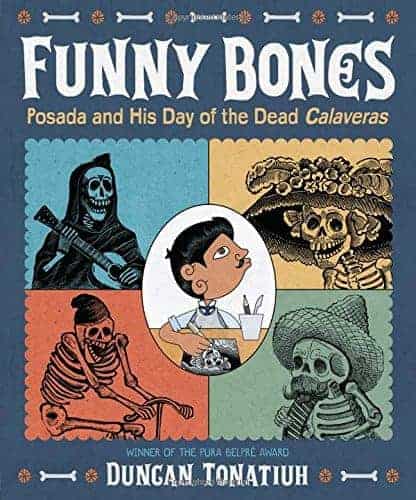
Funny Bones: Posada and His Day of the Dead Calaveras by Duncan Tonatiuh
Mexican artist Don Lupe published short funny poems about skeletons and drew lithographs and skeleton etchings or engravings. His calaveras (skeleton pictures) showed all people types of people and usually had a message, political or social, and which are now iconic images for el Dia de Los Muertos. The artwork and graphic layouts perfectly complement this informative history.
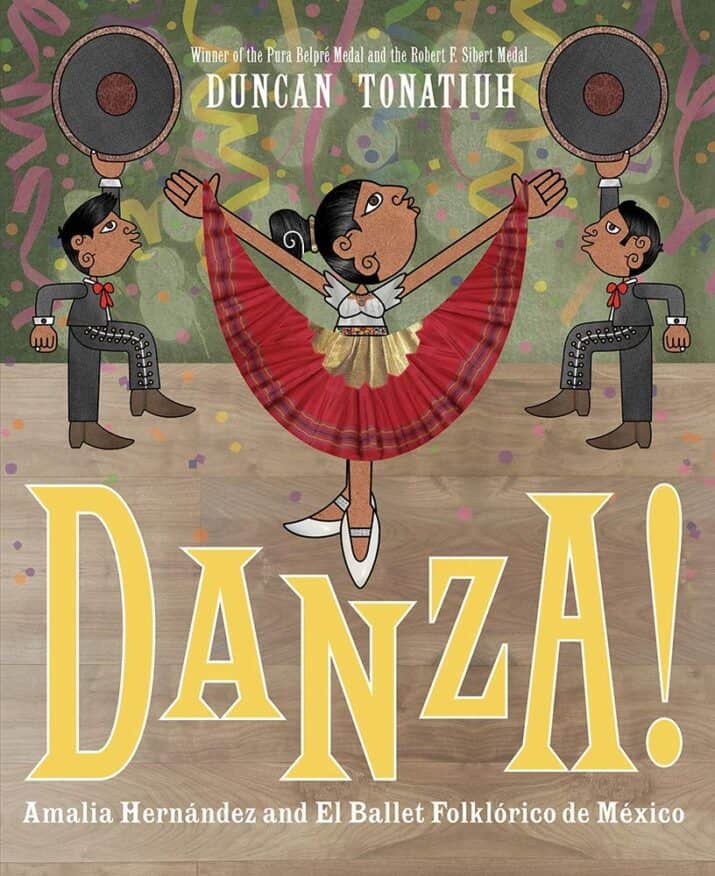
Danza! Amalia Hernández and El Ballet Folklórico de México by Duncan Tonatiuh
Tonatiuh shares the story of a dedicated ballet dancer who discovers the beauty of folkloric dances from the different regions of Mexico. She learns them all, sharing them with the world in performances by her dance company, El Ballet Folklórico. Gorgeous folkloric illustrations enhance each page’s details; I love these so much that I want to frame them all. This is a wonderful tribute to one of my favorite performing companies and the dancer visionary who made it all happen. Added to: Best Biographies for Women’s History Month
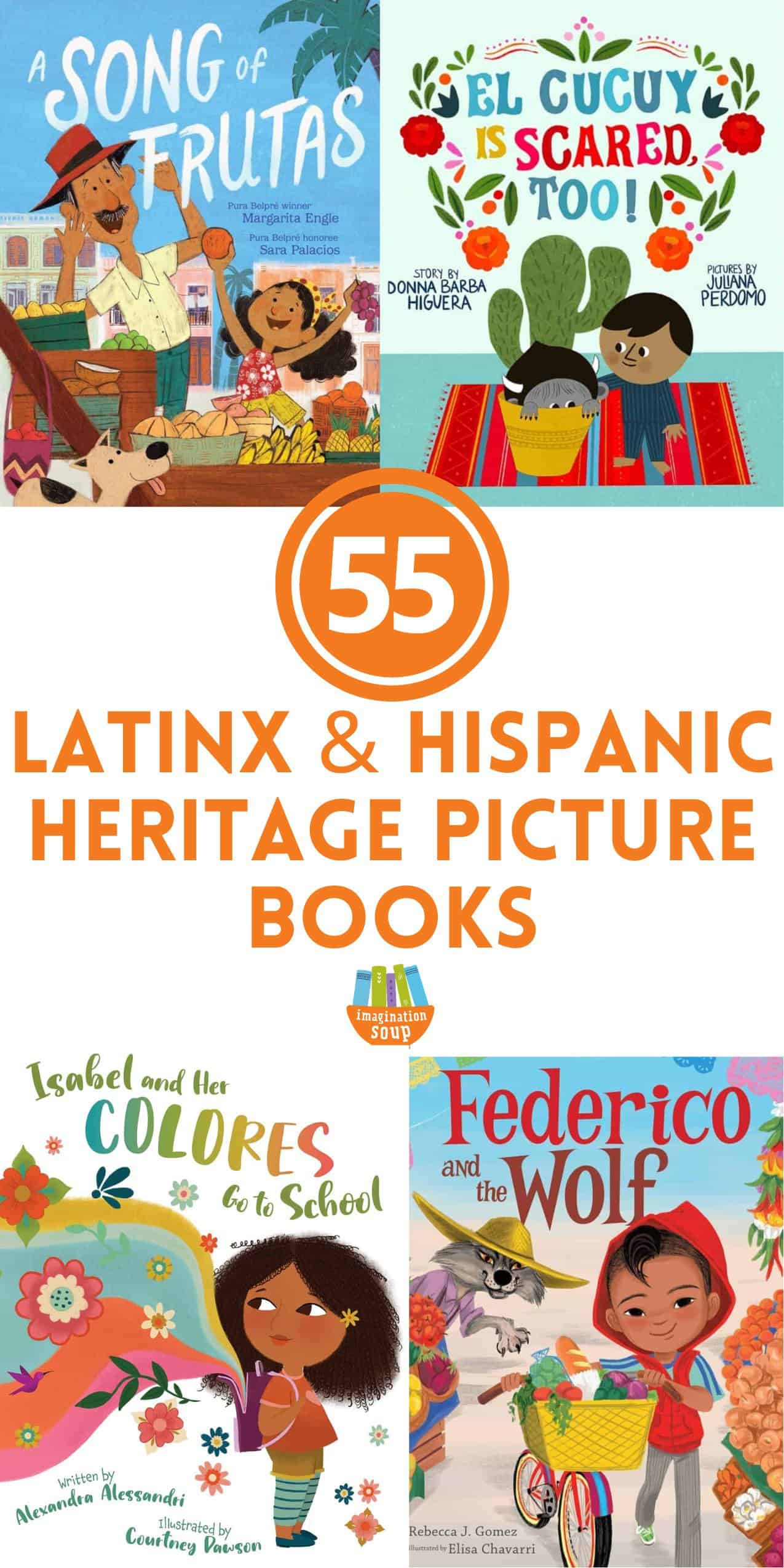
KEEP READING:
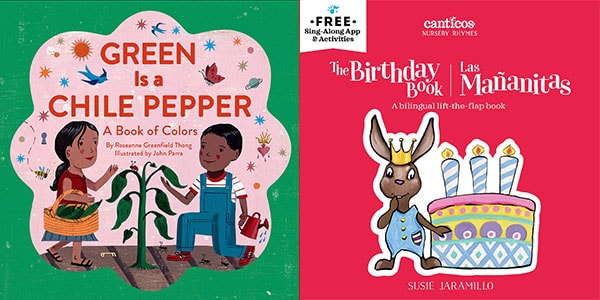
Bilingual English Spanish Picture Books

The Case for Dual-Language Books
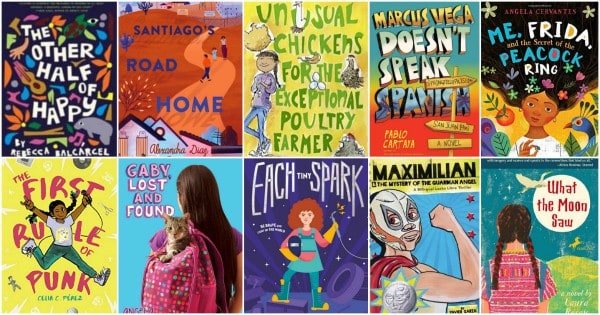
Middle-Grade Books for with Latinx and Hispanic Heritage Month

 PARENTING TIPS
PARENTING TIPS PREGNANCY
PREGNANCY BABY CARE
BABY CARE TODDLERS
TODDLERS TEENS
TEENS HEALTH CARE
HEALTH CARE ACTIVITIES & CRAFTS
ACTIVITIES & CRAFTS